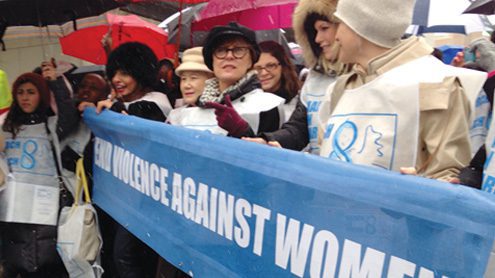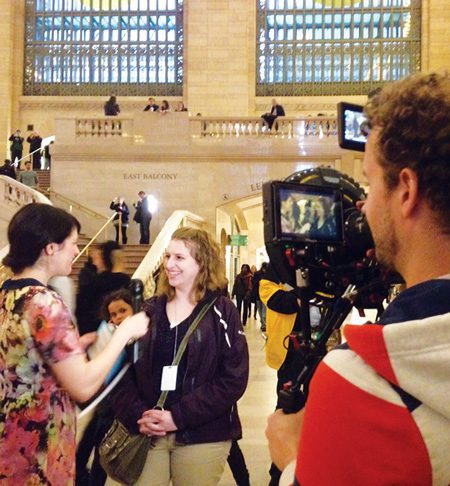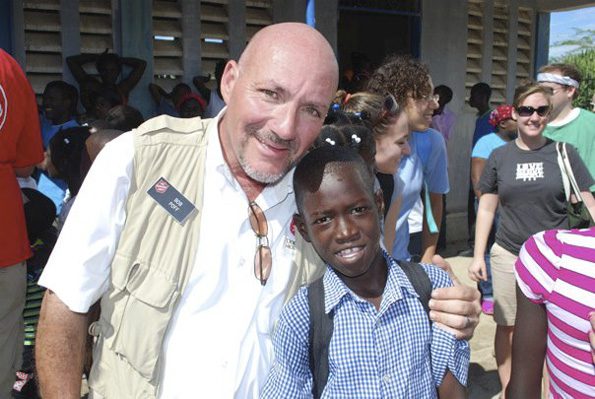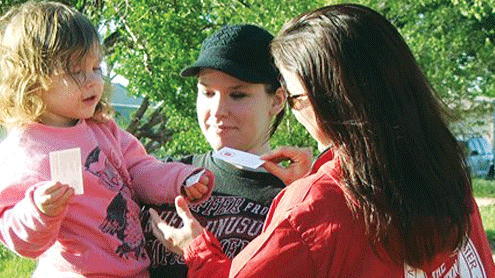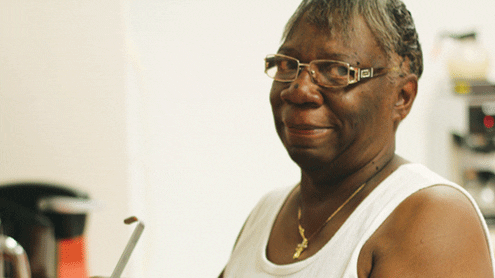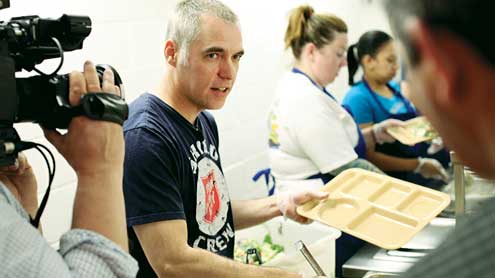Listen to this article
Listen to this article
Loading
Play
Pause
Options
0:00
-:--
1x
Playback Speed- 0.5
- 0.6
- 0.7
- 0.8
- 0.9
- 1
- 1.1
- 1.2
- 1.3
- 1.5
- 2
Audio Language
- English
- French
- German
- Italian
- Spanish
Open text
army attends un’s commission on the status of women. stephanie freeman being interviewed by mtv. photo by jessyca elgart more than 6,000 delegates from around the world were present at this year’s event. by jessyca elgart, major. thousands gathered march 4-16 for the 2013 commission on the status of women (csw) at the united nations (un) headquarters in new york city, including 16 salvation army representatives from the four u.s. territories and the international social justice commission. created by the economic and social council (eocsoc) to prepare recommendations and reports for the council on promoting women’s rights in political, economic, civil, social and educational fields, the csw consists of 45 member states elected by the eocsoc and meets annually for 10 working days. this year’s topic, “ending violence against women and girls,” brought the csw’s largest ever crowd. the majority of the 6,000 delegates participated in nearly 400 workshops held inside the un. the western territory sent four delegates: col. sharron hudson, territorial secretary for women’s ministries; stephanie freeman, program assistant for social justice, alaska division; major jessyca elgart, social services coordinator, sierra del mar division; and major nila fankhauser, community care secretary, alaska division. “although i have read a great deal, seen films and previously attended conferences upon the subject of human trafficking and violence against women, this experience was more powerful,” fankhauser said. “as i listened to women from all over the world, in different languages, from many cultures, the evil of trafficking and violence became much more vivid and real. the importance of doing whatever possible to continue this fight became most evident.”. some workshops were country-specific, while others highlighted effective initiatives. many focused on the contributing factors of gender-based violence and the role of various media in human trafficking. speakers also screened documentaries and shared study results. in one session, an advocate spoke of the importance of words and definitions. she said it is offensive to hear “sex worker” in reference to her former life. prostitution is not an occupation, she explained; there are no benefits, no protection of labor laws, no sick time or vacation, and little monetary compensation, if any. the term, she said, “legitimizes, normalizes, minimizes and sanitizes the abuse and exploitation of vulnerable people.”. major jessyca elgart, stephanie freeman, and major nila fankhauser in the general assembly at the opening session of the commission on the status of women. dr. linda burkle, divisional director of social services for the salvation army in omaha, neb., also spoke at the commission on the topic of “violence against women and the church’s response: a salvation army perspective.”. “the goal of the panel is to demonstrate how the salvation army is involved in preventing violence against women and helping those who have been victims,” burkle said. freeman led a workshop on what the salvation army is doing to combat violence, sharing information and statistics about various programs such as the catherine booth home in seattle, wash., which provides shelter and recovery for those escaping domestic violence. several workshops touched on the role religion plays in trafficking. while it can be a place of comfort and peace, religion has also been used as a means to normalize violence against women and girls. “traditional values or religious beliefs cannot justify the acceptance of violence against women, nor can they be accepted as limitation on women’s rights and freedom,” said dr. isabel apawo phiri, associate general secretary for public witness and diakonia for the world council of churches. “women as well as men are created in the image of god and deserve to be respected, protected and cared for…we the people of the un have a shared responsibility to protect, defend and expand women’s rights and freedom.”. attendees made final resolutions at the conclusion of the csw, which will be presented to the eocsoc and then to the general assembly where member states will be asked to ratify the resolutions.
Open context player
Close context player
Plays:-Audio plays count
army attends un’s commission on the status of women. stephanie freeman being interviewed by mtv. photo by jessyca elgart more than 6,000 delegates from around the world were present at this year’s event. by jessyca elgart, major. thousands gathered march 4-16 for the 2013 commission on the status of women (csw) at the united nations (un) headquarters in new york city, including 16 salvation army representatives from the four u.s. territories and the international social justice commission. created by the economic and social council (eocsoc) to prepare recommendations and reports for the council on promoting women’s rights in political, economic, civil, social and educational fields, the csw consists of 45 member states elected by the eocsoc and meets annually for 10 working days. this year’s topic, “ending violence against women and girls,” brought the csw’s largest ever crowd. the majority of the 6,000 delegates participated in nearly 400 workshops held inside the un. the western territory sent four delegates: col. sharron hudson, territorial secretary for women’s ministries; stephanie freeman, program assistant for social justice, alaska division; major jessyca elgart, social services coordinator, sierra del mar division; and major nila fankhauser, community care secretary, alaska division. “although i have read a great deal, seen films and previously attended conferences upon the subject of human trafficking and violence against women, this experience was more powerful,” fankhauser said. “as i listened to women from all over the world, in different languages, from many cultures, the evil of trafficking and violence became much more vivid and real. the importance of doing whatever possible to continue this fight became most evident.”. some workshops were country-specific, while others highlighted effective initiatives. many focused on the contributing factors of gender-based violence and the role of various media in human trafficking. speakers also screened documentaries and shared study results. in one session, an advocate spoke of the importance of words and definitions. she said it is offensive to hear “sex worker” in reference to her former life. prostitution is not an occupation, she explained; there are no benefits, no protection of labor laws, no sick time or vacation, and little monetary compensation, if any. the term, she said, “legitimizes, normalizes, minimizes and sanitizes the abuse and exploitation of vulnerable people.”. major jessyca elgart, stephanie freeman, and major nila fankhauser in the general assembly at the opening session of the commission on the status of women. dr. linda burkle, divisional director of social services for the salvation army in omaha, neb., also spoke at the commission on the topic of “violence against women and the church’s response: a salvation army perspective.”. “the goal of the panel is to demonstrate how the salvation army is involved in preventing violence against women and helping those who have been victims,” burkle said. freeman led a workshop on what the salvation army is doing to combat violence, sharing information and statistics about various programs such as the catherine booth home in seattle, wash., which provides shelter and recovery for those escaping domestic violence. several workshops touched on the role religion plays in trafficking. while it can be a place of comfort and peace, religion has also been used as a means to normalize violence against women and girls. “traditional values or religious beliefs cannot justify the acceptance of violence against women, nor can they be accepted as limitation on women’s rights and freedom,” said dr. isabel apawo phiri, associate general secretary for public witness and diakonia for the world council of churches. “women as well as men are created in the image of god and deserve to be respected, protected and cared for…we the people of the un have a shared responsibility to protect, defend and expand women’s rights and freedom.”. attendees made final resolutions at the conclusion of the csw, which will be presented to the eocsoc and then to the general assembly where member states will be asked to ratify the resolutions.
Listen to this article











